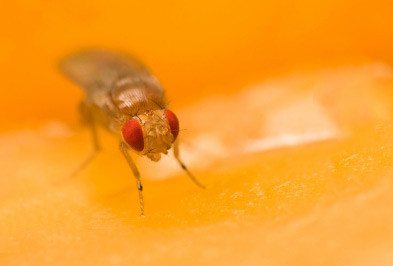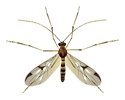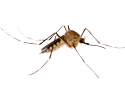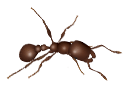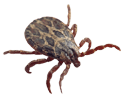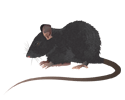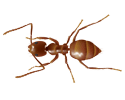Fruit Flies
What Do Fruit Flies Look Like?
Fruit flies are a very small oval fly with adults growing only to be 1/8th of an inch length. Their thorax is tan in color and their abdomen is black with a gray underbelly, fruit flies, however tend to have an overall tan appearance. Fruit flies often have red eyes, although some can have dark colored eyes. Their antenna has feathery bristles coming off of it.
Why Do I Have Fruit Flies?
Fruit flies will enter into homes through open doors and windows or through gaps found around exterior windows and doors. Fruit flies can also be introduced into your home by purchasing fruit, vegetables, or poorly sealed jarred or bottles goods that are already infested with fruit flies or their larvae.
They will also be attracted to your property if you have a garden, compost pile, or have garbage that is not being properly contained in a trash receptacle with a sealed lid.
What Are The Feeding Habits Of Fruit Flies?
As their name suggests fruit flies feed on decaying fruit, vegetables and other organic items; when living outdoors fruit fly numbers will increase over the summer with their numbers being at their highest during the harvest season. Populations that are found indoors with a consistent food sources will be active year-round. Fruit flies are most active during the day and will feed on the surface of overripe or decaying plant matter. They will also feed on honeydew (secretions) that is produced by aphids.
What Threats Do Fruit Flies Pose?
Fruit flies do not bite and are generally seen as a nuisance pest. Even so, great care should be taken to eliminate and prevent these pests in and around your home because they live and visit areas that are unsanitary- garbage piles, sewers, and outdoor drains to name a few. They will pick up dangerous diseases and bacteria on their bodies and legs; they will then spread those diseases and bacteria all over your food, home, and anything else that they land on.
How Do I Control Fruit Flies?
Controlling fruit flies and other flying insects in and around your property can be a difficult task, one best left to the professionals. Contacting Holder’s Pest Solutions at the first sign of fruit flies is the ideal solution.
How Do You Prevent A Fruit Fly Infestation?
There are several steps that you can take as a homeowner to help prevent a fruit fly infestation from occurring in your home. The best way to prevent a problem with fruit flies is to make sure that any food or drinks in your home are stored properly. Keep fruit and vegetables inside of the refrigerator and make sure that open liquor, beer, or soda bottles are properly stored or discarded, not left out on counters. Other prevention tips include:
- Discard overripe fruits or vegetables from your home.
- Inspect food before purchasing it and bringing it into your home.
- Ensure that window or doors screens are completely intact.
- Caulk gaps found around windows and doors.
- Regularly remove garbage from your home.
- Ensure that outdoor garbage cans have tight fitting lids on them and that they are stored a distance away from your home.
- Fix leaky pipes and other fixtures in and around your home.
Contact Holder’s today for fruit fly inspection, prevention and treatment.
Related Post From Our Blog
Forecast Calls for Increased Flying Pest Population in Houston
With warmer, wetter spring weather on its way, we can expect to see a higher than normal flying pest population this year. Houston’s winter weather brought warmer than normal temperatures – who remembers the 80-degree [...]
Stinging Insects and What to Do About Them
Justin Schmidt is arguably the most dedicated entomologist in his field. He finds stinging Hymenoptera – bees, wasps, etc. – so fascinating that he willingly lets these creatures pierce his skin in order to fuel [...]
Has This Wet Texas Spring Brought You New Pests?
Wet weather drives pests into homes, and moist basements make them never want to leave. If you understand these two principles, you may actually be able to reverse the infestation that may already be happening in your home.


